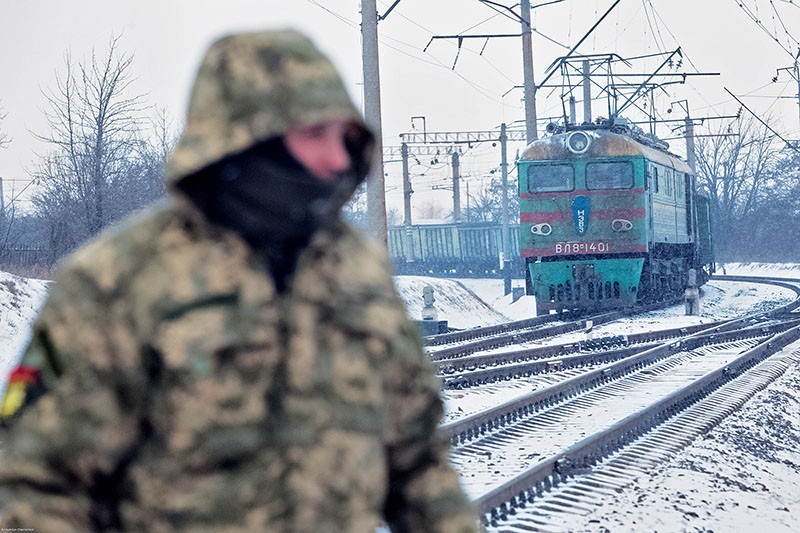In early September, the shelves of supermarkets in Luhansk were well stocked with goods produced in the government-controlled parts of Ukraine – beer, juice, mineral water, sweets and cosmetics.
They shouldn’t have been: In March, the National Security and Defense Council issued an order banning all trade with the Russian-occupied parts of the Donbas, with only humanitarian aid and the personal belongings of travelers being allowed to cross the front line. President Petro Poroshenko confirmed the order later that same month.
It doesn’t look like the flow of goods across the front line has stopped. It has just become totally illegal.
On Nov. 28, the SBU state security service said its officers had found goods and computer equipment worth some $167,000 at a warehouse in the town of Verkhniotoretske in Donetsk Oblast, which is located in the “gray zone” between the two waring sides’ front lines.
The SBU also said it had found near the cities of Sloviansk and Kostiantynivka counterfeit cigarettes worth almost $150,000, which had been produced in Russian-occupied territory.
As many food products from the government-controlled part of Ukraine are both higher quality and cheaper, smuggling them to the Russian-occupied area is a profitable business – despite the risk of being caught and fined.
“High demand means high profitability,” said Artem Davydenko, an analyst from the Independent Defense Anti-Corruption Committee (NAKO), a joint international and Ukrainian civil monitoring group.
Davydenko was one of the authors of a report presented in Kyiv on Nov. 28 on the illegal trade across the separation line in the Donbas. The report was based on 40 interviews with soldiers, activists, and representatives of law enforcement bodies.

Donbas are attempting to prevent supplies of anthracite coal moving from Russian-controlled to Ukrainian-controlled territory. The government has warned that this could lead to shortages of fuel at power stations, and power blackouts within weeks. (Kostyantyn Chernichkin)
Huge variety
According to the report, most of the smuggled goods go to the Russian-occupied parts of the Donbas. But since Donetsk produces cheap counterfeit cigarettes at the city’s Khamadey factory, and Luhansk makes cheap vodka at its Luga-Nova distillery, these products are being smuggled to the government-controlled side.
A huge variety of goods crosses back in return.
Davydenko told the Kyiv Post that in one case this year fiscal service officers stopped a suspicious car driving to the Russian-occupied area. In the trunk were lots of metal plates. When they were assembled, they formed an entire church dome.
In another case, law enforcement officers saw two men on a horse-drawn carriage heading to the Russian-occupied area. On the way back, the men were pulling the carriage themselves – they had sold their horse for its meat.
In spring, a woman was detained by officers of the state border service while trying to take 2,000 ducklings into Russian-occupied territory. She had planned to take the birds by boat across the Siversky Donets river, which divides government-controlled and the Russian-occupied territory in Luhansk Oblast.
In fact, the illegal river crossing point near the town of Triokhizbenka, 30 kilometers to the north-west of the Russian-occupied city of Luhansk, is one of the main routes for illegal trade in the oblast. In winter time, when the river freezes over, the locals carry goods across it on sleighs.
Smuggling routes
According to the report, the smugglers use the five legal crossing points to transfer goods, bribing soldiers to carry them across the frontline, or send the goods to Russia and then across the uncontrolled part of the Ukrainian-Russian border into the Russian-controlled part of Donbas.

A soldier goes through the positions of army Donbas-Ukraine special force battalion near the frontline town of Chermalyk on Oct. 12. 2017 (Volodymyr Petrov)
One of the easiest schemes involves hiring people, so-called “mules”, to carry goods from one truck on one side of the separation line, to another one waiting on the other side. Every person is allowed to carry up to 75 kilograms of goods across the front line. So this scheme makes the transfer technically legal.
“Each of these ‘mules’ could travel five times per day across the separation line,” said Andriy Rymaruk, a former soldier and now a volunteer helping the army.
The “mules,” who bribe law enforcement, cross the separation line without standing in line, unlike the thousands of regular residents, who often spend long hours waiting to cross.
Another scheme involves the special humanitarian logistics center in Mayorsk, which was intended to become a special market for businessman to sell cheap goods to residents living in the gray zone between the front lines. It has actually turned into a logistics base for the smugglers, where trucks drop off loads for the “mules” to lug across the lines.
Davydenko said that while Ukrainian rail company Ukrzaliznytsia claims no trains have traveled between the Russian-occupied parts of Donbas since March, some sources cited in the report claim that the railway is still being used to haul coal to the government-controlled area by DTEK company, which belongs to the richest Ukrainian Rinat Akhmetov.
Davydenko added that DTEK had denied the claims and promised to show the evidence that the company now uses coal produced at its coal mines in Russia’s Rostov Oblast.
Smugglers have also tried to send goods to the occupied territories in humanitarian convoys. In February, a court issued an order to seize 100 radios that a driver from Akhmetov’s humanitarian foundation Pomozhem (We Will Help), had tried to smuggle into the Russian-occupied territory.
Lift the ban?
The scale of the illegal trade, while still less than in 2015 and 2016, costs the state lost revenues in underpaid taxes, Davydenko said.
The illegal trade also undermines the morale of Ukrainian soldiers and gives certain people a financial interest in the continuation of the war.
Rymaruk said that the commander of one Ukrainian battalion had forced Russian-led forces to release his captured subordinate company commander, telling them that if they did not release the man, he would no longer allow trucks with smuggled goods to cross into the area they control.
Davydenko suggested increasing the fines for smuggling and putting more resources – people and equipment – into law enforcement’s anti-smuggling units. Opening new legal crossing points would motivate more locals to cross the separation line legally, he said. And X-Ray scanners for cargo at the crossing points and on the Ukrainian border with Russia would also help detect smuggled goods.
But George Tuka, a deputy minister on the temporarily occupied territories, said the best way to stop the illegal trade would be simply to make the trade legal – with the exception of trade in goods that could be put to a military use.
Lifting the ban would mean there would be no need to bribe law enforcement officials and the military, and the tradesmen would have to pay taxes, Tuka said.
“What is the purpose of banning some person from taking a ton of cheese (across the lines)?” he said. “Would it stop the war?”
